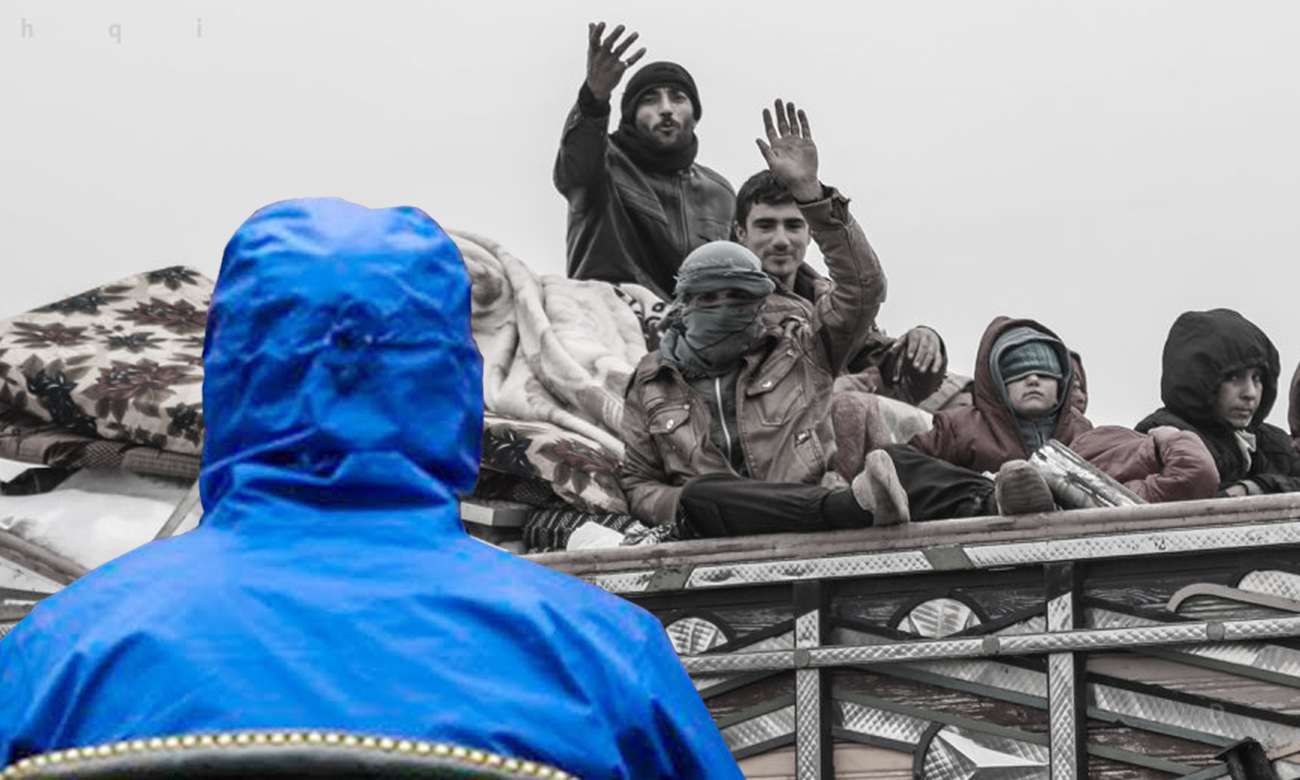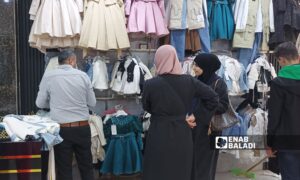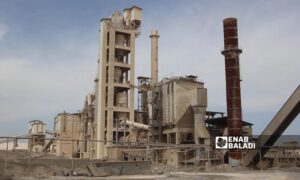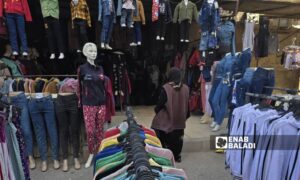
Caesar Act burdens more pressure on Syrians; unable to ‘overthrow’ al-Assad regime

Enab Baladi – Jana al-Issa
Two years have passed since the Caesar Syria Civilian Protection Act went into effect, in which the US legislation sanctions the Syrian regime, including its head Bashar al-Assad, for war crimes against the Syrian people and obliges the US President to impose sanctions on al-Assad’s allies.
The Act came into force on 17 June 2020, when it imposed sanctions on three individuals close to the Syrian regime and six entities and companies affiliated with it, to be followed months later by sanctions on an individual and three affiliated companies.
During these two years, the economic and living situation of Syrian civilians witnessed an unprecedented deterioration, which sparked controversy over the issue of sanctions imposed on the regime.
Voices came out calling for their removal, based on their limited or sometimes “zero” impact on the regime and its men, in return for their ripple effect on civilians residing inside and outside Syria as well.
In this report, Enab Baladi focuses on the real impact of sanctions on Syrian civilians and the mechanisms that can double the impact of sanctions on the Syrian regime.
Sanctions on vital sectors
Wael al-Alwani, an expert in data analysis and financial crimes and technical director at the Observatory of Political and Economic Networks, told Enab Baladi that the sanctions imposed on sectors have the most significant impact on the lives of Syrian civilians residing inside or even outside Syria.
Al-Alwani divided the types of US sanctions imposed on the Syrian regime and its institutions and businessmen affiliated with it into three types, namely, sanctions imposed on sectors, sanctions lists that target specific people in terms of assets freeze and travel ban, etc., and secondary sanctions that target individuals and entities under Caesar Act.
He added that one of the types of sanctions the US usually imposes is embargoes at the state level, such as those imposed on Iran and Cuba, but they are not effective for the Syrian regime.
Caesar Act
The Caesar Syria Civilian Protection Act of 2019 is United States legislation that sanctions the Syrian regime, including its head Bashar al-Assad, for war crimes against the Syrian people and obliges the US President to impose sanctions on al-Assad’s allies.
The Act was approved by the US House of Representatives on 15 November 2016 and was signed into law by former US President Donald Trump on 21 December 2019 and came into force on 17 June 2020.
The Caesar Act is named after a Syrian military photographer who leaked 55,000 photos of 11,000 detainees in 2014 who were killed under torture which the Federal Bureau of Investigation (FBI) confirmed its authenticity and aroused world public opinion at the time. The photos were shown in the US Senate.
The Act includes all those who provide military, financial and technical support to the Syrian regime, including companies, people and countries, even Russia and Iran, and it targets all those who provide aid for reconstruction in Syria.
Impact on Syrians
The deterioration of the value of the Syrian pound, the weakening of purchasing power, and the frequent rise in the prices of daily basic materials have played a major role in the decline in the living and economic life of most residents inside the regime-controlled areas for more than two years.
Regime officials claim that the bad situation is the result of “Western sanctions imposed on Syria, specifically the sanctions of the Caesar Act.”
Al-Alwani says that it is the sanctions targeting the economic sectors that have affected the Syrians. He explained the officials’ promotion that the impact they are experiencing is due to the sanctions of Caesar’s Law by the extent of the regime’s annoyance with the law, the reason for its issuance, and the international scandal that affected it.
Sanctions targeting vital sectors affect Syrians inside and outside Syria, experts say.
The sanctions on the banking sector have led some foreign banks to exaggerate the issue of implementing laws with countries called high-risk areas, and as a result, they close bank accounts for Syrians outside Syria and prevent them from making money transfers. In addition to the severe control imposed on every amount, no matter how small, that is transferred to Syria, according to al-Alwani.
Sanctions imposed on specific sectors also affect other sectors that are not covered by the sanctions, such as the health and food sectors. Those wishing to invest or work in these sectors also fear the penalties that may affect them, given that the war-torn country is subject to a number of sanctions.
Limited impact on Syria regime, why?
The sanctions did not practically affect the Syrian regime and the close businessmen and their internal work; on the contrary, they may have enriched them even if the sanctions imposed on them ended their actual and official international economic activity.
Expert al-Alwani says, “when talking about the impact of sanctions on the Syrian regime, we are here talking about a regime that has been on the sanctions lists for a long time and has been implicated in supporting terrorism, so it has mechanisms that it designed to avoid these sanctions throughout those years, which makes their impact really limited.”
The Syrian regime and those with influence and power use the loopholes in the legitimate tools of international financial law to serve their interests, such as shell companies and front companies, and companies that cooperate with deceptive lawyers and chartered accountants who are able to forge many official papers, adds al-Alwani.
For his part, Diaa al-Ruwaishdi, professor of international law at the American University in Washington, explained to Enab Baladi that, from a procedural point of view, the Caesar Act can be considered as a mandate from the US Congress for the American executive authority to assess the situation in Syria and collect evidence about violations of the law and impose penalties on perpetrators.
Most of the time, this evidence is more abundant with regard to public entities and personalities, including influential political and military figures, al-Ruwaishdi said.
Sanctions will not bring the regime down
According to previous historical experiences of many countries, such as Venezuela, Iran, and North Korea, sanctions against totalitarian regimes do not drop them but rather aim to correct the regime’s behavior, confirms the expert in financial crimes, Wael al-Alwani.
Despite the frequent talk about the usefulness of the Caesar Act in closing the doors to the regime and punishing it, it targets only 13 individuals and entities.
To talk about a mechanism that can direct the sanctions to have a greater impact on the Syrian regime, al-Alwani believes that for the regime to be able to circumvent the sanctions, it is necessary to know the twisted ways it is taking and to catch up with it to punish it as well, and this is not happening.
The expert explained that to increase the sanctions’ impact on the regime and reduce their effect on civilians, the US administration should direct the removal of types of sanctions on the sectors which mainly affect the Syrians.
It should also start with imposing additional penalties on a large scale, controlling their work and activating them literally, without neglecting any part of them, such as the sanctions lists that target people and secondary penalties that target people and entities, al-Alwani adds.
For his part, Diaa al-Ruwaishdi, a professor of international law, stressed that economic sanctions did not and will not overthrow a political regime, but they contribute to undermining its authority to varying degrees.
Economic sanctions have a negative impact on ordinary citizens, the amount of which is determined by the design and enforcement of sanctions.
“When penalties are general, their impact is more severe on citizens, and therefore this matter must be taken into account at the stage of determining and enforcing penalties, according to the context and circumstances of each country,” according to al-Ruwaishdi.
He also explained that states and political persons have networks and keys that help them to circumvent sanctions, and it may be difficult at times to know these networks and their ways of working, which leaves an outlet for public figures and states to limit the impact of economic sanctions, unlike the ordinary citizen.
Accordingly, al-Ruwaishdi believes that what matters in the matter of imposing economic sanctions is precisely defining their objective, scope, and methods of enforcement and trying to mitigate their negative effects on citizens if they are the only way to advance any political process.
US negligence over Caesar’s sanctions
The US Senate held a hearing on Syria on 8 June, which was chaired by the Chairman of the Senate Foreign Relations Committee, Democratic Senator Bob Menendez, entitled “The Path Forward on US-Syria Policy: Strategy and Accountability.”
At the opening of the session, Menendez questioned the strategy of the administration of US President Joe Biden in Syria, considering that the frozen conflict in Syria leads to enormous humanitarian, political, and security dilemmas amid the laxity of the US administration.
In turn, Republican Senator James E Risch said that the policy of economic and diplomatic isolation imposed by the United States on Syria to impose a political solution has begun to collapse.
Expressing his concern that the administration has accepted al-Assad’s rule as an imposed outcome, he said, “Worse, I fear this administration is tacitly approving outreach to the regime.”
Risch added that “the implementation of (Caesar) sanctions was absent, and the administration’s support for energy deals through Syria to Lebanon would likely violate (Caesar’s) Act. Moreover, I am very concerned about the administration’s funding of so-called (early recovery) projects in regime-held areas, these activities blur the line against the reconstruction prohibited by (Caesar) and open the door to normalization with Assad.”
Al-Alwani explained the US administration’s reservations about launching more secondary sanctions (sanctions imposed under the Caesar Act) as being issued by the US Congress, and their imposition or removal needs its approval.
While other US sanctions are issued by executive decisions, their imposition and removal needs to be signed by the US president only, which is considered easier for the US administration.
While al-Ruwaishdi, the professor of International Law, says that the US administration deals with the Syrian file without a clear strategy and that this file is not a priority for the US administration, as it sees it as a negotiating paper and perhaps the only clear goal of the US administration is to ensure that the Islamic State (IS) group does not reappear, as he put it.
if you think the article contain wrong information or you have additional details Send Correction
النسخة العربية من المقال
-
Follow us :
Most viewed
- Kurdish Protection Units: Key point of contention between Damascus and SDF
- Syria and Lebanon sign agreement for cooperation in border demarcation
- Arrests and explosive seizures in security campaign in old Damascus
- Struggle for Syrian phosphate awaits fate of Russian contract
- Thousands of Syrian employees await their fate

















 A
A
A
A
A
A








 More Economic Reports
More Economic Reports